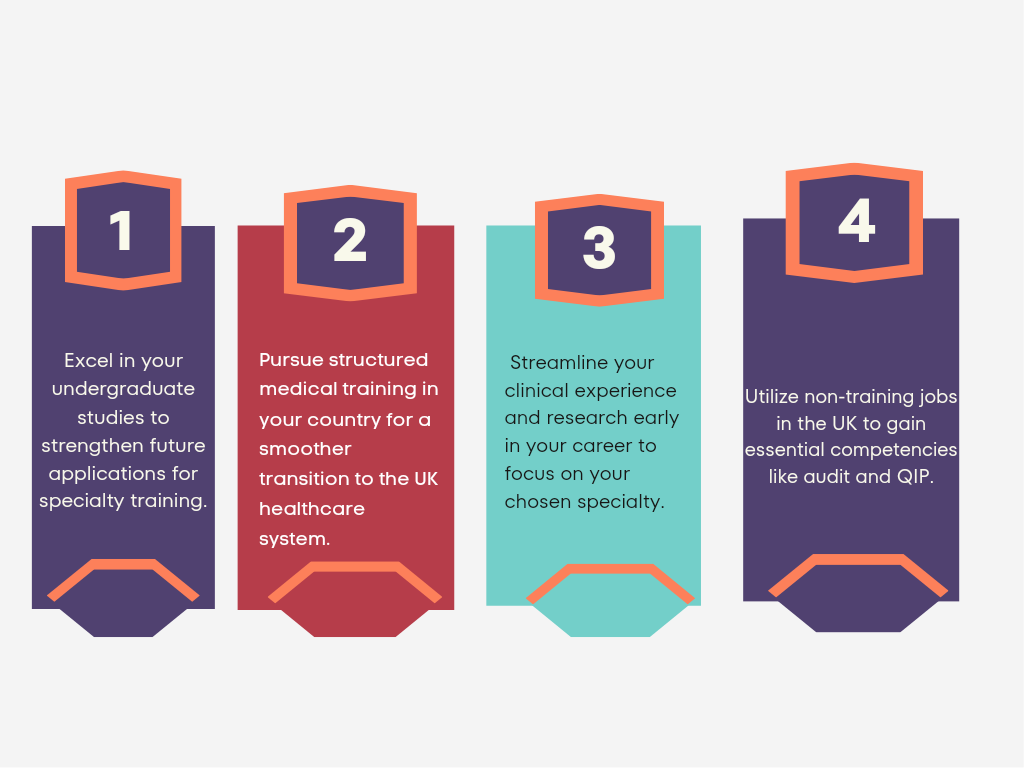Hello and welcome to my website. Today we will hear from Dr. Operajitha Roy. She is from India,now serving as a doctor in UK. Let’s discover her journey. She is going to take you through her professional journey from India to the UK. This has been one of the most requested blogs by my visitors. Also, in this blog, I am going to share with you some pro tips that will help you to smoothen your journey if you are making a switch from India to the UK. So, please keep reading this blog till the end.
Dr. Operajiand’s Journey
I was born and brought up in Kolkata. I went to Nabanalanda High School, followed by Gokhale Memorial Girls’ High School. I did my MBBS from Nil Ratan Sircar Medical College in Kolkata, which is a government medical college. I completed my MBBS as the second-highest scorer of my batch, and I had honors marks in surgery, forensic medicine, ENT, and community medicine. Now, why am I telling you this? This is because when I applied for a specialty training post in diabetes and endocrinology, my honors marks – that is, my undergraduate achievements – helped me score top marks in the self-assessment score in this category.
So, Pro Tip 1: How your undergraduate degree will help you. Those of you who are still doing MBBS and want to move to the UK following your MBBS, work hard during your undergraduate days. Try and achieve prizes or honors marks at the undergraduate level, so that this gives a rock-solid foundation to whatever post you are applying for.
Following my MBBS, my NEET PG rank was 132, and I got into medicine in VMMC and Safdarjung Hospital in New Delhi. My MD medicine degree was immensely helpful in building up a professional career in the UK. It gave me a rock-solid clinical experience to begin my professional journey in the NHS. It gave me research experience in the form of theses. It gave me teaching experience also. MD medicine got me a high score in the postgraduate section of the self-assessment score in specialty training applications.
Pro Tip 2: Why structured medical training in India is important. So, Pro Tip number two: structured medicine training is very, very important if you want to make a switch from India to the UK and want to develop a long-term career in the NHS. Post-MBBS, if you are not keen on the NEET PG route, think about IMT training in the UK. This gives you the advantage of entering the training program in the UK earlier than post-MRCP, which would make substantial specialty training applications much easier. However, if you are not keen on IMT training and following MBBS, you are waiting to complete all steps of MRCP. Getting into MD medicine is a very good idea, as it has multiple benefits.
Now, coming back to my journey, following MD medicine, I did senior residency in neurology for one year in Safdarjung Hospital. However, I quickly realized that neurology was really not my forte. I quickly course-corrected and took up a senior residency post in diabetes and endocrinology, and this was also my first step to prove my commitment towards diabetes and endocrinology as a specialty. Commitment to a specialty is a very serious evaluating criterion in any candidate’s job application in the UK. Consistency in a specific specialty in a candidate’s professional journey is extremely important and must be reflected well in the candidate’s CV.
Pro Tip 3: How to streamline your India experience with the UK. Streamline your clinical experience, your Research,Publication, Courses, and Conferences
Towards a specific specialty in which you want to further your career in the UK, try to do this early in your career, right from your MBBS days. If you’re sure that you want to do a specific specialty like medicine or surgery, the sooner you streamline your career in a chosen specialty, the better.
I completed both steps of MRCP in India, following which I was struggling to get a PACES seat. So, if you’re also in a similar situation where you’re struggling to get a PACES seat, please read this blog so that you can get important insight as to how you can maximize your chances of getting a PACES seat in the next diet.
So, as I was struggling to get a PACES seat, I got to know about the MTI program in the UK. This was a very good opportunity for me to further my career in the UK. It helped me to prepare and pass PACES. I gained a lot of experience of working in the UK. It helped me to understand the social and cultural aspects of life in the UK, and also, most importantly, helped me to achieve competencies required to apply for specialty training like audit, QIP, etc.

Pro Tip 4: Why non-training jobs in the UK are important. Do not underestimate the importance of a non-training job in the UK. Use it to your advantage to achieve competencies that you could not have achieved in your home country, like audit and QIP. Try to streamline these projects in your chosen specialty again to prove your commitment towards a specific specialty.
Following the MTI program, I hand-picked the role of a senior clinical fellow in the renowned Diabetic Foot Clinic at King’s College Hospital in London. This was an extremely enriching experience for me as I got to learn so much about diabetic foot first-hand from world-renowned clinicians. Also, I continued my CV building with a QIP in the diabetic foot clinic. I made an international oral presentation on the topic of multidisciplinary care in diabetic foot patients.
After all this hard work, I applied for specialty training in diabetes and endocrinology, and I have been successful in my interview and have secured a National Training number in this specialty in London.
Pro Tip 5: Set a goal and work hard towards achieving that goal. Ask yourself why do you want to come and work in the UK? Be it a CESR application that you’re striving towards or IMT training application or specialty training application. Do not let anyone tell you that you can’t do it. This is a myth that international doctors cannot get into training in big diners like London or Manchester. That is not true. If you work hard towards your goal and if you persevere, you will be able to achieve whatever you want.
It is to be focused in achieving the required competencies and start working hard on your e-portfolio. Also, please do not underestimate the competition ratios in the specialty. Remember, in your home country, you’re only competing against your peers who have had a similar background or similar clinical experience, whereas in the UK, you’re competing with not only UK graduates but also graduates from all over the world who are striving towards IMT training or specialty training.
So, do not compare your achievement with other candidates. Cut out all the noise, set your goal, and work hard towards achieving that. That’s it for today, guys. I hope this blog was useful in giving you some important insight as to how to smoothen your journey from your home country to the UK. Please let me know in the comment section below how you found this blog and also let me know what are the topics you would want me to make blogs on.


“Education is the passport to the future, for tomorrow belongs to those who prepare for it today.” – Malcolm Xr
Related Articles
5 Exciting Facts for Doctors in the UAE You Can’t Miss
Table of Contents Introduction to Working in the UAE as a Doctor So, one thing that is very very important is that the UAE is a tax-free country, like some other Arab countries. There is no tax you have to pay in these countries. So, because of this tax-free status,...
MRCP vs PLAB: 10 Expert Tips for International Medical Career Success
Table of Contents Hi, are you considering a postgraduate medical career in the UK and confused about the MRCP or the PLAB route and wondering which is the best for you? You are not alone in this. The UK medical landscape is rapidly changing with scarcity of Junior...
MRCP vs. PLAB: Which Path Will Make You a Top Doctor in the UK?
HIGHER STUDIESHi, are you considering a postgraduate medical career in the UK and confused about the MRCP or the PLAB route and wondering which is the best for you? You are not alone in this. The UK medical landscape is rapidly changing with scarcity of Junior doctor...

